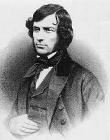John Mitchel was born on November 3, 1815 at Camnish, County Derry, Ireland. He was given a classical education at local schools before attending Trinity College, Dublin, from the age of fifteen. Mitchel completed his degree in 1834 and worked as a bank clerk in Derry, leaving to take up a position in a solicitor's office in Newry by 1836. The same year, Mitchel met Jane Verner and the pair was married on February 3, 1837; their first son, John, was born a year later.
In 1840, Mitchel completed his apprenticeship as a solicitor and moved his family to Banbridge to open a practice. During this time he became increasingly involved in the Irish nationalist movement, publishing essays. In 1843, he joined the Repeal Association, and became a regular contributor to the prominent nationalist newspaper The Nation.
Mitchel quit his profession as a solicitor in 1845 and joined The Nation as a full-time journalist, moving his family to Dublin in the process. At The Nation, Mitchel presented himself as a staunch nationalist and was an outspoken critic of British policy. As his views grew more radical, he left The Nation to start his own weekly newspaper, The United Irishman, in 1847.
The first issue of The United Irishman was released on February 12, 1848, and paper grew to be immensely popular. Tensions between the Irish nationalists and the authorities were escalating during this period and new laws were introduced to curb this growing dissent. On 15 April 1848, Mitchel and two of his associates were charged with sedition. Although acquitted of sedition, Mitchel’s charges were controversially reconsidered under the new Treason Felony laws, and he was found guilty and sentenced to fourteen years penal transportation. First sent to the prison hulks in Bermuda, then was later transferred to the Cape of Good Hope, South Africa before being transferred again to Tasmania, arriving there in April 1850.
It was during this long journey through British colonial convict establishments that Mitchel composed his most famous work, his Jail Journal; or, Five Years in British Prisons. Upon reaching Hobart, Mitchel was reacquainted with his former associates who had also been convicted on grounds of treason and sent out to the Australian colonies. Mitchel was soon granted parole and obtained a ticket of leave, enabling him to settle in a cottage near Bothwell. In June 1851, Mitchel’s wife and children joined him at the cottage.
In 1853, plans were laid by associates of Mitchel to transport him from Tasmania to the United States. J. P. Smythe, an Irish sympathizer working as a journalist for an American newspaper, travelled to Hobart in June and was able to successfully aid in Mitchel's escape. In November that same year, Mitchel arrived in New York and established another newspaper, The Citizen. From January 14,1854 to August 19, 1854, Mitchel published his Jail Journal in serial form in The Citizen, only publishing it as a book much later in 1868.
Mitchel continued his newspaper writing and remained politically active in the United States. In 1865 he became the editor of the Daily News, and subsequently spent half a year in a New York jail for criticising the government. In 1867 Mitchel left his position as editor at the Daily News to establish the Irish Citizen, in New York.
Though in his seventies, Mitchel began preparations to return to Ireland and re-enter the Irish political scene. On July 26, 1874, he landed at Cobh in the south of Ireland, and began campaigning as an Independent Nationalist in the Tipperary constituency, where he was ultimately unsuccessful. On March 20, 1875, Mitchel died at his home in Newry.
See full Austlit entry.
 5853440203900180985.jpg
5853440203900180985.jpg

